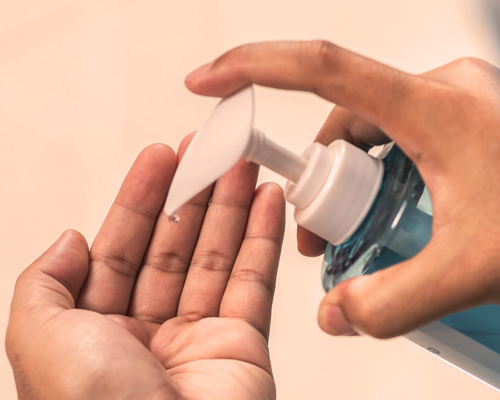As the novel coronavirus (COVID-19) pandemic strains health systems worldwide, there is growing concern about its potential impact on the supply chain for medical products in low- and middle-income countries (LMICs). As country borders closed and countries dependent on imports for essential medicines were left empty-handed, substandard and falsified (SF) products began proliferating in LMIC markets, further threatening public health and imperiling other ongoing health programs. This spring, the World Health Organization's (WHO) Global Surveillance and Monitoring System on SF Medical Products reported nine different instances of falsified chloroquine products from three African countries, just one example of numerous reports from around the world.
U.S. Agency for International Development (USAID) has a long history of strengthening health systems in LMICs, including medicines regulatory systems and capacity for local production within the private sector. This has better positioned countries to respond to the challenge of addressing SF medical products.
Medical product manufacturers and regulatory authorities are now tapping capacities that were strengthened with support and investment from USAID through its Promoting the Quality of Medicines (PQM) program, which was implemented by USP between 2009–2020. PQM helped to strengthen 91 quality control laboratories in 33 countries and provided technical assistance to 45 manufacturers in 12 countries for the production of 23 essential medicines. Below are two country experiences that highlight the program’s lasting impact.
In Pakistan, PQM supported institutional capacity building for product quality assurance within the Drug Regulatory Authority of Pakistan (DRAP) since its establishment in 2012. PQM strengthened DRAP’s capacity for product registration, inspection, and post-marketing surveillance for medical product quality. The PQM program also helped improve medical product manufacturers’ quality management systems for Good Manufacturing Practices (GMP).

As a result, DRAP was positioned to respond quickly and robustly to support Pakistan’s COVID-19 outbreak. Early in the COVID-19 pandemic, USP shared its hand sanitizer tool kit with DRAP and the manufacturers in Pakistan that had received technical assistance from PQM. The toolkit contains USP recommendations for making alcohol-based hand sanitizers for consumer use. Drawing on this information, more than 50 private pharmaceutical and chemical companies in Pakistan began producing quality hand sanitizer. DRAP then expedited registration of new hand sanitizers, fast-tracking registration for manufacturers that had well-established track records for quality control of other medical products.
DRAP has registered more than 150 new hand sanitizers, which are available across the country. The increased supply has helped expand the availability of this important preventive product for citizens. In addition, DRAP turned to national quality control laboratories strengthened through PQM to conduct quality tests on hand sanitizers already being sold in the country. DRAP found 23 products that were substandard and removed them from the market, further safeguarding public health.
“Due to PQM’s support and technical assistance, DRAP’s regulatory response to the COVID-19 pandemic has been system-based and faster than it would have been in the past. Before DRAP would have been reactive, but now we are being proactive in our response to the ongoing situation,” said Mr. Asim Rauf, Chief Executive Officer, DRAP.
In Indonesia, COVID-19 has hit hard, with more than 100,000 cases reported in July 2020. Three Indonesian pharmaceutical companies that received technical assistance from PQM to strengthen their quality systems to comply with international manufacturing standards, such as those required for WHO Prequalification, are now producing essential medicines. They include levofloxacin, amoxicillin, and hydroxychloroquine. The companies have helped to maintain steady, quality-assured supplies within Indonesia despite disruptions in the global supply chain due to the pandemic. Levofloxacin is used to treat tuberculosis and hydroxychloroquine is used to prevent and treat malaria. Amoxicillin is a broad-spectrum antibiotic used to treat bacterial infections, including pneumonia. With PQM support, two of the companies, PT Kalbe Farma Tbk and PT Sanbe Farma, achieved recognition from the WHO for the quality of their levofloxacin 500 mg coated-film tablet and oxytocin injection, respectively.
"The system-based approach utilized throughout PQM’s support gave our company the opportunity to adopt international best practices. The knowledge gained on dossier compilation for WHO [prequalification] submission improved our ability in terms of local and export product registration. Overall, our company’s good manufacturing practices compliance has been strengthened and allowed us to respond more quickly and efficiently to produce some of the medicines to fill the increasing demand, especially during the COVID-19 pandemic,” said Mr. R. Muh Sumarno, Director, PT Kalbe Farma.
USAID and its investments in the PQM program positioned Pakistan and Indonesia to respond ably to the pandemic and meet their populations’ needs for quality-assured medical products. PQM’s legacy extends far beyond these two countries. PQM’s many science-based, quality assurance tools and resources, such as the Foundations of Good Manufacturing Practices course, are free and online. In addition, the full repository of PQM technical resources are available to access and download.
PQM’s work continues under USAID’s new Promoting the Quality of Medicines Plus (PQM+) program, which is implemented by USP and its consortium of partners. PQM+ sustainably strengthens quality assurance systems by providing technical assistance to manufacturers of priority health products and to Medicines Regulatory Authorities to improve product registration, inspection, post-marketing surveillance, and to build the capacity of national quality control laboratories. PQM+ (2019-2024) works with LMICs to expand their supply and improve the quality of essential medical products used to prevent and treat diseases such as tuberculosis, malaria, and neglected tropical diseases, and to improve maternal, newborn and child health.
